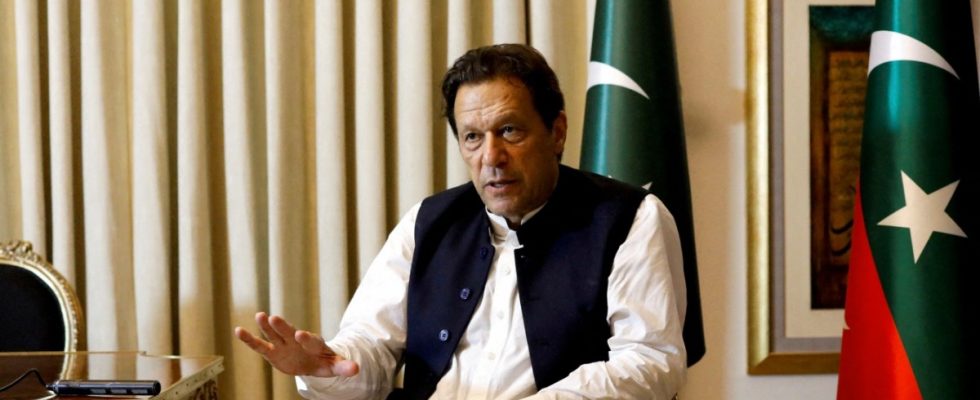He had a premonition. Because in the past few months he has been exposed to one trial after the next, 180 lawsuits have now been filed against him – that’s what Imran Khan said almost three weeks ago in an interview with the Süddeutsche Zeitung portrayed. “Sooner or later I will go to jail because I will not be able to defend myself against all these cases,” the former Pakistani prime minister said. In his view, all cases were baseless and politically motivated.
His prediction came true over the weekend. A court in the capital Islamabad sentenced the charismatic and controversial politician and former cricket star to three years in absentia for alleged corruption offences. According to the police, Khan was arrested at his home in Lahore and will be taken to Islamabad behind bars.
For Khan himself and his followers it is clear: he is the victim of a conspiracy. The 70-year-old politician, who was ousted by a no-confidence vote in parliament last year, has the country’s two powerful political dynasties, led by the Bhutto-Zardari and Sharif families, against him. And the two have teamed up with the almighty military.
“He’s just too popular at the moment.”
“The verdict was passed without our legal arguments being heard,” said Syed Zulfiqar Bukhari, a former minister in Khan’s cabinet Süddeutsche Zeitung after the court order on Saturday. Khan will appeal the verdict. If it becomes law, Khan will be barred from political office for the next five years. The former prime minister is accused of keeping income from the sale of state gifts secret. The whole spectacle, according to Bukhari, serves one purpose only: “Imran Khan should be kept out of the elections, he’s just too popular at the moment.”
In fact, the incumbent Prime Minister Shehbaz Sharif announced just a few days ago that parliament would be dissolved next week and that new elections would be held within 90 days. The incumbent government, with the support of the all-powerful military in Pakistan, is now trying to neutralize Khan politically, says Bukhari.
Khan won the 2018 elections by a large majority and became prime minister. At that time he was still able to triumph with the backing of the army, without which no central decision can be made in the nuclear state of Pakistan. Khan, a populist who has only had meager results as head of government but who remains extremely popular with large sections of the population, had managed to break the power of the Bhuttos and Sharifs at the time. These two major political dynasties in the country had taken turns in government in changing constellations over the past decades, and mostly led the country extremely incompetently.
“If you don’t get up, you will lead the lives of slaves.”
There are numerous allegations of corruption against both families, they have repeatedly fallen out with the military or, as is the case at the moment, made a temporary deal. The Bhuttos and Sharifs have formed a governing alliance since Khan’s ouster in April of last year, although they have at times been deadly enemies in the past. Now Khan, the common political opponent, has welded them together.
Supporters of Imran Khan protest in the Pakistani city of Quetta on Saturday.
(Photo: Banaras Khan/AFP)
Khan became a folk hero in Muslim Pakistan when he captained the Pakistan national cricket team to a world title in 1992. After the end of his sporting career, he worked persistently on his political career, not leaving the country even when a general ruled Pakistan and he would have had it much more comfortable in exile. He has repeatedly emphasized that he wants to fight the current conflict: “I refuse to leave the country,” he recently told the SZ.
Neutral observers in Pakistan are convinced that Khan would win the next elections, should he be allowed to run again. Most independent observers emphasize that he often lashes out at the United States in populist terms and does not distance himself clearly enough ideologically from the Taliban, who have been back in power there for two years since the West’s catastrophic withdrawal from neighboring Afghanistan. However, they do not classify Khan as corrupt. “They’re afraid of him,” says a Pakistani analyst of the country’s powerful establishment. Therefore, they tried with all their might to keep him out of politics.
Immediately after the arrest, Khan’s team released a video message from the former prime minister: “If this message reaches you, I will be in prison.” And he calls on his followers to take to the streets: “If you don’t stand up, you will lead the lives of slaves. You must continue the peaceful protest.” The ousted prime minister knows very well that if he still wants to have a chance, it can only be done with the support of the masses.

